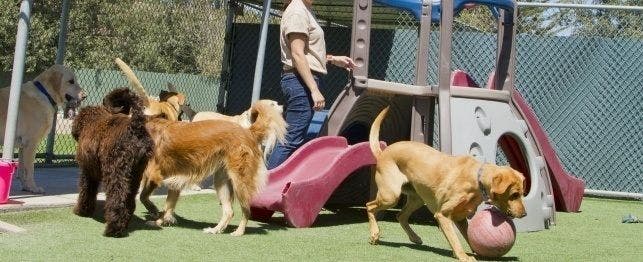
Kennel Cough in Dogs
How Do Dogs Get Kennel Cough?
You might think your dog has something stuck in their throat. The cough associated with acute infectious tracheobronchitis (or kennel cough) is a high-pitched, honk-like cough, sometimes followed by retching.
Kennel cough is a highly contagious inflammation of the trachea (windpipe) and bronchial tree caused by a contagious virus (adenovirus, parainfluenza virus, canine distemper virus) or bacterium (Bordetella bronchiseptica). The disease is associated most often with dogs housed in a high-density population or boarding kennel. Infectious agents can be transmitted through the air or by contact with contaminated surfaces. Puppies and younger dogs are at greatest risk, but even old dogs can acquire kennel cough.
The incubation period from the time the dog first contracts the infection to the time that symptoms develop is typically between 3 to 10 days, and the symptoms can last for days to weeks. A mild to moderate cough without other symptoms is usually self-limiting; however, occasional cases become lingering and cause chronic bronchitis.
Kennel Cough Symptoms in Dogs
Kennel cough causes a variety of symptoms that can vary in severity.
- Signs of upper respiratory problems such as conjunctivitis (irritated eyes), rhinitis (runny nose), or sneezing may be observed.
- Cough. The classic symptoms are bouts of a loud, honking cough that worsen with activity or excitement and can persist for several minutes. The dog will often act as if something is stuck in the throat and retch or vomit up fluid after coughing. If secondary bacterial pneumonia develops, the dog often shows signs of illness such as loss of appetite, depression, or fever.
- Loss of appetite
- Depression
- Fever
- Difficult breathing
Any of these signs should prompt a visit to see your veterinarian in order to be certain pneumonia has not set in.
Diagnosis of Infectious Tracheobronchitis in Dogs
A complete medical history will usually reveal recent exposure to a kennel or other dogs. Windpipe sensitivity is present in most cases. Diagnostic tests are needed to recognize kennel cough and exclude other diseases. These tests may include:
- A chest X-ray may be recommended to determine if pneumonia is present.
- Routine laboratory blood tests, complete blood count (CBC), or blood chemistry panel is not necessary unless your pet is showing signs of generalized illness, fever, or loss of appetite.
- A fecal flotation should be done to exclude intestinal parasites.
- If signs of eye involvement are observed, the cornea of the eye should be examined carefully.
Kennel Cough Treatment for Dogs
Therapy is controversial because the disease is usually self-limiting (like a human cold) and, if a viral infection is suspected, antibiotics can’t kill the virus. This is especially true in mild, uncomplicated cases where treatment is supportive, not unlike that given to a person with a bad cold. Treatments for kennel cough may include one or more of the following:
- Cough suppressants are appropriate for some pets with kennel cough. Your veterinarian can discuss the pros and cons of this treatment. Injections or pills (butorphanol) are often used, but occasionally, a stronger medicine is needed (codeine-related) to break the cough cycle. Don’t use over-the-counter human medicine without first speaking to your veterinarian.
- Antibiotics are used in some patients, especially if Bordetella infection or secondary bacterial infection is likely.
- If the symptoms do not improve or should they become chronic, a careful re-evaluation including blood tests and a chest X-ray is indicated.
Home Care
- Deworming of puppies is appropriate if they have not recently received such treatments.
- Limit exercise and enforce periods of rest; don’t exercise or play with your dog. Activity often initiates periods of loud, uncomfortable coughing.
- Encourage adequate fluid intake to maintain hydration. Provide soft food if dry food irritates the throat.
- If your dog normally wears a restraint collar, remove it or replace it with a harness to decrease airway irritation.
- Avoid environmental stresses including house dust, vapors, chemical fumes, and tobacco smoke.
- To mobilize secretions and reduce coughing, provide humidified air (e.g. a vaporizer in the dog’s room or in a steamy bathroom for one or two hours).
Preventative Care
Vaccinations provide protection against kennel cough in most dogs. However, like all vaccinations, protection is not 100 percent guaranteed, and some dogs will contract kennel cough despite vaccination.